In sickness and in health
Wedding vows don’t include the sickness and health of a spouse’s parents. I suppose it’s implied, but it wasn’t something that we considered or discussed until we were confronted with choices. Joe and I were like a small business partnership. We had been collaborating on life’s twists and turns and had been in agreement on all of the big decisions and most of the small ones. Helping Dad with care needs was an easy choice, but we made decisions related to the circumstance without clearly understanding the full impact or the longer-term ramifications.
We did not factor in that Dad was not comfortable collaborating. He had no interest in joining our organization. He had been running and operating his own small business just fine without us. Seven years prior, when Joe and I moved to France, we were very excited about our adventure. In an oddly similar way, we were embarking on a new journey together as a couple, a rite of passage.
Recognize both the sacrifice and the reward
Sacrifice
Family
Back in the US, we settled in and started helping out. We didn’t consider that at the same time that Dad’s needs increased, we would feel the pull to be closer to Joe’s parents. By air or road, it took a day of travel to arrive at his folk’s place. We were able to visit them on a regular schedule for the first few years. Then, Joe was able to continue to see his parents, while I made fewer trips when leaving Dad became more challenging. Recently, Joe’s folks experienced some serious health challenges, and it was a wake-up call. We knew that we were where we needed to be, but uncertainty still crept in through the cracks. As if the strain of current caregiving emotions weren’t enough, I worried about future guilt and resentment. For the short term, COVID-19 isolation meant that the option to visit Joe’s folks was off the table.
Goals
While in our 50’s, Joe and I had planned to hike the AT. That didn’t look likely now. Another hope, Joe wants to work with his Dad, who owns a machine shop. Will I feel guilty when windows of opportunity closed while we were caring for Dad? Will Joe be resentful? Should we have had conversations about this prior to now? Where did we misplace that handy, How To: Do Life manual?
Reward
We frequently acknowledged the upside. Joe was getting to know Dad, albeit a different version, since aging does alter a person’s character. Dad’s intelligence, curiosity, humor, and general good nature came through in spite of the challenges he faced, and it was a gift that we were able to spend these years with him. Joe experienced and appreciated the appeal of Florida. He often remarked in wonder at wearing shorts in the winter. I realized a treasure trove of gifts at the end of the path to acceptance.
Balance competing priorities
Two years ago
Two years ago, I was managing Dad’s care primarily on my own. A neighbor checked on him daily and brought the occasional meal. The prior home care service became less useful when due to a policy change, the aides could no longer leave the house to run errands or take Dad on outings. Those were the things that offered me the most respite from caregiving, so I began using other services such as grocery delivery and Uber Concierge for Dad’s outings that did not require an extra set of ears and pre-sorted medicine delivery. Joe and I lived 15 minutes away. My days revolved around keeping Dad and his household running. As I spent more and more time at Dad’s, priorities became mixed and muddled. I struggled with balancing Dad’s needs and ours.
One year ago
A year ago, it became clear that Dad needed more oversight and that our arrangement was not working. Missed meds, accidents resulting from poor judgment, and kitchen mishaps were just a few of our concerns. Dad could not be cajoled into moving. I remembered that Dad and Mom moved locations with his mom when she was 98 and again when she was 99. I knew it was not recommended. It can be disorienting and lead to a sharp decline. Joe and I moved back into his two-bedroom condo. He was happy to have us. It was a difficult adjustment, but after acceptance, we began to better manage the systems that kept us sane.
We evaluated and re-evaluated what worked and what didn’t. Because challenges shifted daily, so did solutions. We learned to compromise for the sake of peace, and this sharpened our understanding of what truly mattered. With priorities in focus, there was less competition. What was a priority for us regarding Dad’s care may not have been so important to Dad. We eliminated as many potential threats to his well-being as possible. Systems were put in place to support his safety, health, and hobbies. We scheduled our outside activities in a way that fit our work schedule and Dad’s schedule, much easier when isolating. Dad had no idea what went into managing our team of three, but that was part of the strategy.
Be flexible
We organized ourselves around Dad’s space and his routine so that not much changed for him. He had the master bedroom and bath with a walk-in shower. He spent most of his time in the Florida room or the painting studio corner of his bedroom. His carpet was a colorful Picasso-style work of art. A better alternative to the throw rug that we removed a few years prior. It caused him to trip and land on his chair. He broke three ribs. Senior safety 101: No throw rugs.
Dad’s eyesight was diminished by glaucoma and macular degeneration. He could see a ring of vision. The center and peripheral vision were blacked out. The donut hole of vision was sharp; it just took a lot of maneuvering to use it. We set up the pantry, cabinets, and refrigerator in a way that everything he used or ate was in the most easily accessible locations. All items had an assigned location. We solved problems as they arose to keep the kitchen, the most commonly used common space, and other areas convenient and safe.
Be creative
We put room dividers up in a portion of the dining room, and Joe worked in this area. I started there, but Joe was more successful at tuning out Dad’s noise than I was. Dad talked to himself, talked to the TV, and filled the silence with nonsensical chatter and general jabbering that made us laugh but was a bit of a distraction.
“Design is a funny word. Some people think design means how it looks. But of course, if you dig deeper, it’s really how it works.”
Steve Jobs
My “office” is in our bedroom, where we also store two paddle boards, two bikes, and our camping, kayaking, and other sports gear. It is like the Swiss Army knife of living spaces and functioned as our bedroom, our garage, my office, and our storage room. Our closet is small, and our bathroom is small, but we are not bothered by the size. This is tiny home training. Also, our time in France prepared us well for next-level space maximization.
French lessons
Châteauneuf-Sur-Loire
Our first home, in the Loire Valley, wasn’t small, but our bedroom didn’t have a closet. Our bathroom had a micro shower but no tub. There were no bathroom cabinets, countertops, or towel racks. We had no coat closet and no laundry room cabinets or shelves. We actually didn’t have a laundry room. The washing machine sat in a big open room that transformed into different uses over the years. We worked out solutions for each space or storage challenge, and it all came together like a puzzle. We lived in a beautiful small village on the Loire River. I would have been happy living in a shoebox with an outhouse.
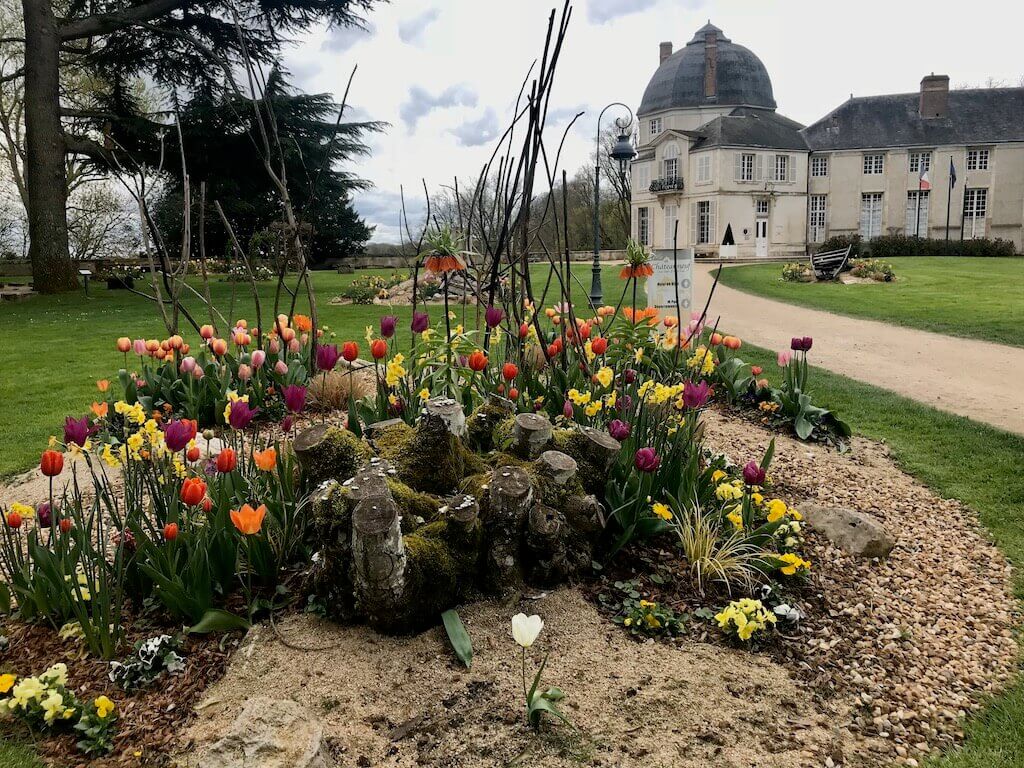
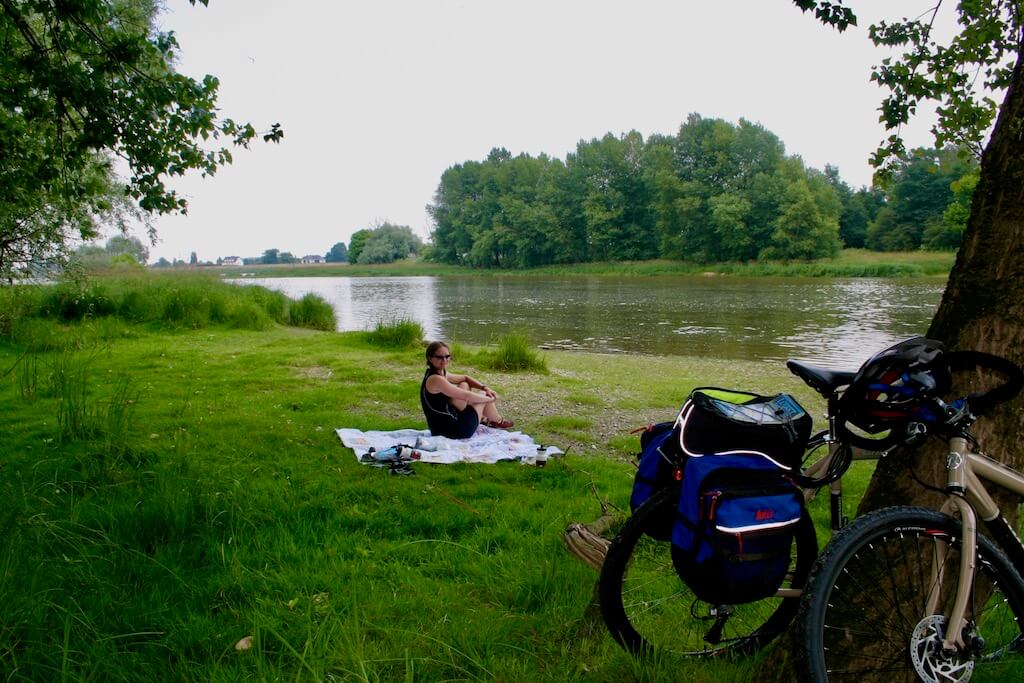
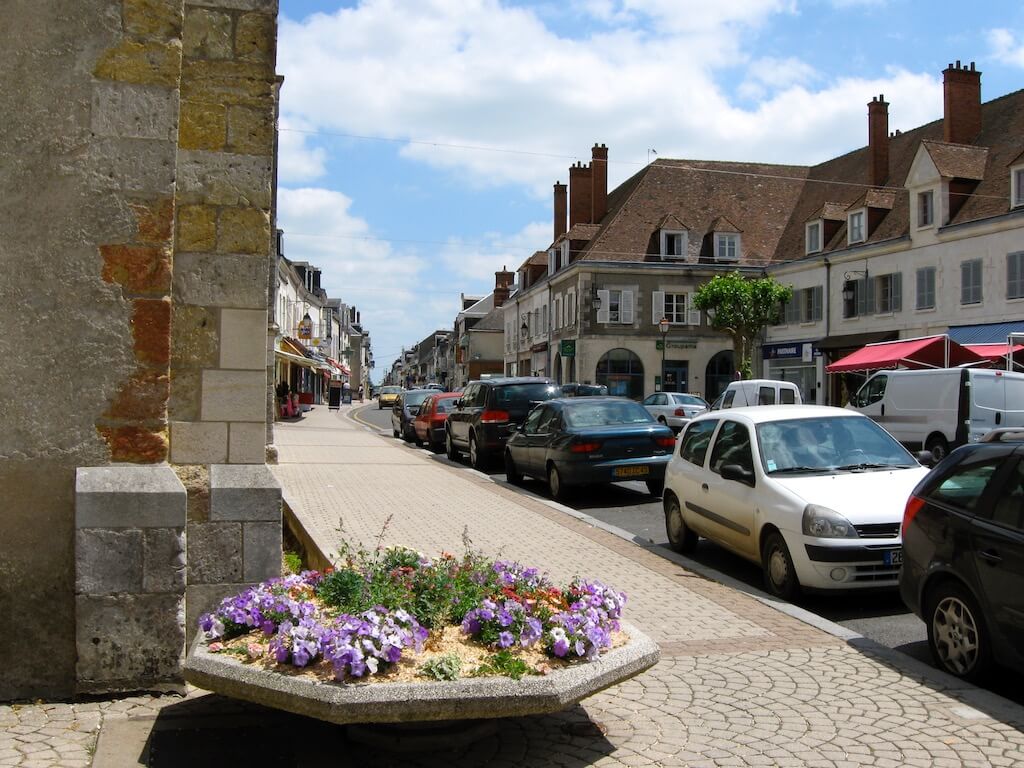
Thury-Harcourt
We moved from a town of 6,000 in the Loire Valley to a town of 2,000 in Normandy. We selected a beautifully renovated barn. The bathroom had a tub but no shower. It had a double sink with loads of counter and cabinet space. The toilet was in an adjacent room that did not have a connecting door. This layout was not uncommon, just an adjustment for us that once made, made perfect sense. The rafters and the railings made perfect cat perches! In Châteauneuf, we had a small concrete courtyard. We ate outside every chance possible and listened to the swallows swoop by. In Normandy, we had a large yard with fruit trees. We planted a vegetable garden, flowers, and fresh herbs and also ate outside as often as possible, wondering how the swallows had known where to find us.
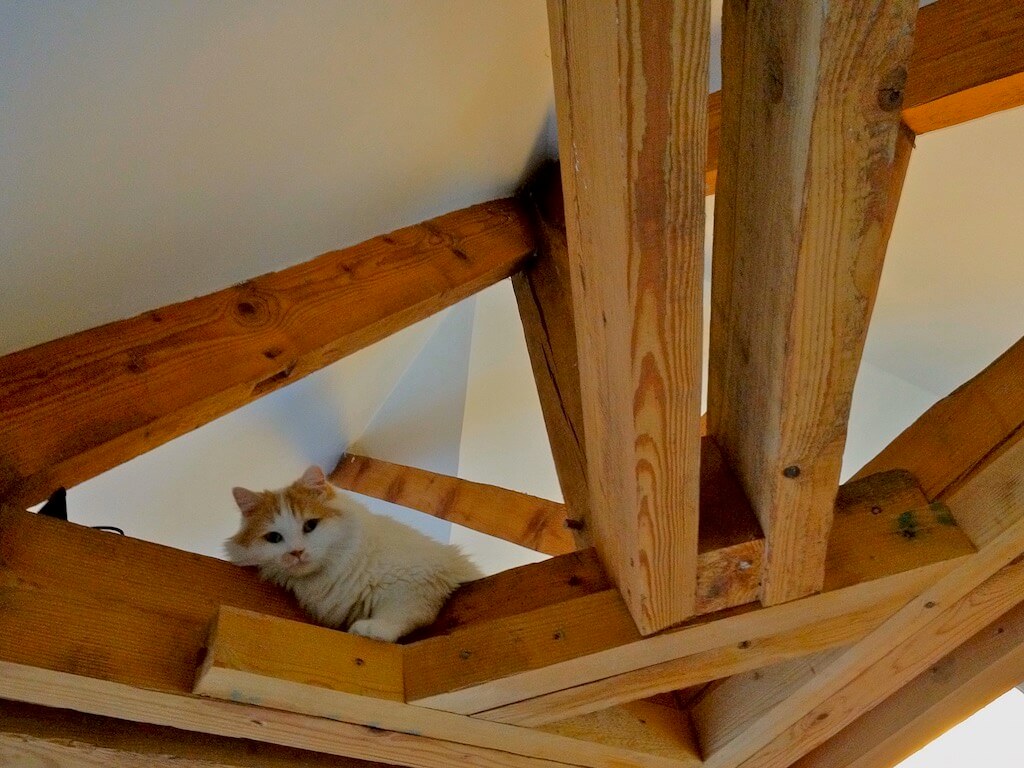
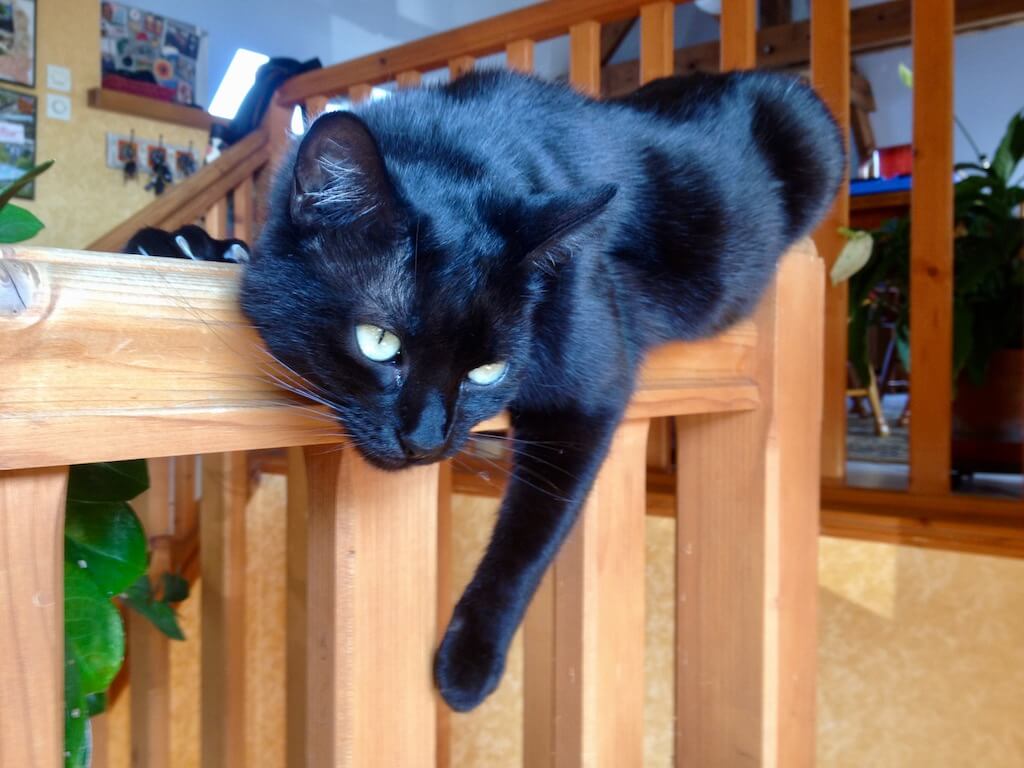
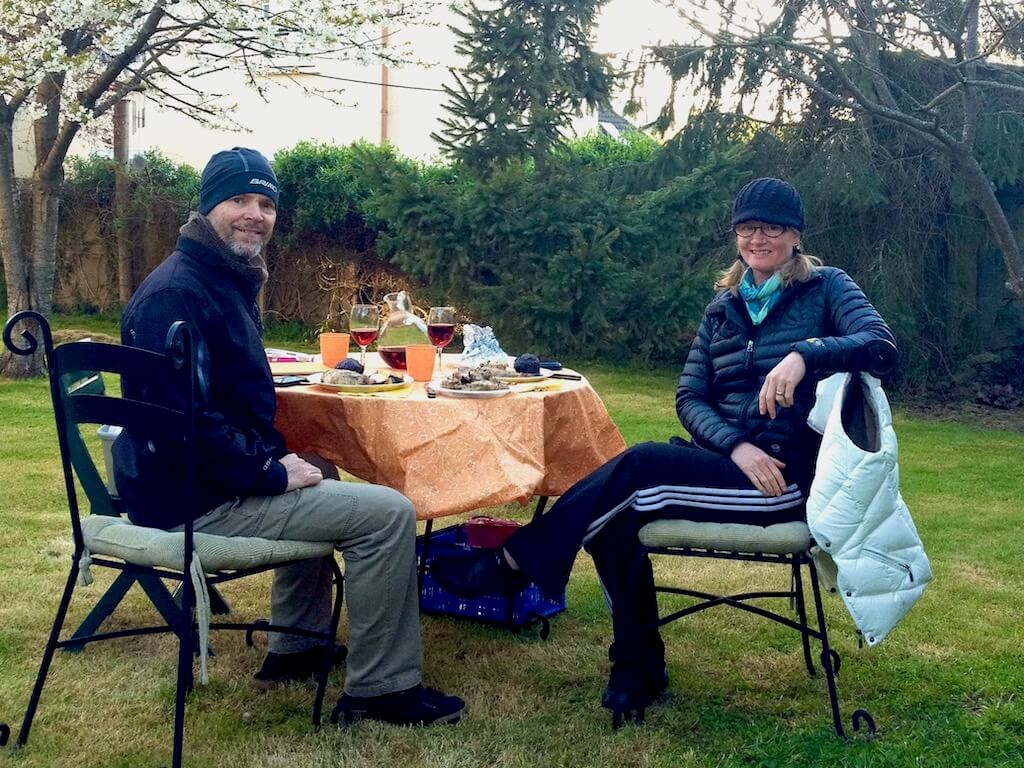
We loved our time in France and loved our living spaces. We learned a lot about ourselves, learned that we had taken a lot for granted, and learned that there are many ways to accomplish a thing and none are right or wrong, just different. Also, circumstances change. An inconvenience today may be remembered with a certain fondness tomorrow.
Accept the new normal
It was hard for me to be in this new space of Dad’s, not because of the size, but because it was not ours. The common areas were nonagenarian bachelor decor, and Dad did not want that to change. I tried to declutter, modernize, and coordinate colors, but at the end of the day, it was his home. I acquiesced. There would be time to create our own space again in the future. Now was the time for me to learn about creating space in my head for stillness and in my heart for compassion.
“Just keep in mind: the more we value things outside our control, the less control we have.”
Epictetus
It was hard for Joe as well. He said, “Accepting the situation did not always come easy. We both had a vision of what our future would be like, and it was difficult to accept that the future we planned together was put on hold. Adding to that, was the uncertainty of the end of the hold. If the end date was known, it would be easier to accept. In order to accept the situation, we needed to say, ‘Ok, we are here for an undetermined amount of time. Even though this is not the location or living situation that we expected, how can we make the most of it?’ For us, finding outside activities that are available in FL and actively participating in those was key.”
Share the role and responsibilities
Once we moved in and Joe saw the scope of work, he engaged in caregiving on an epic scale. He was an effective problem solver. He offered to switch office space when the noise became too great a distraction. Joe took over The Sweep, Dad duties that had caused conflict when I ran the play; He made several tours throughout the day through Dad’s area to check on or deal with meds, meals, dishes, supplies, clean up, and whatever else might need attention. He took Dad’s second phone and answered it, foiling telemarketers before they could reach their target and ensuring that Dad got the calls from family and friends, which he often missed because he couldn’t hear or couldn’t find the phone. I was in the process of starting a new business, and Joe continued to look for more ways to take chores off my plate. He took over the grocery shopping and, a few months later, the cooking.
Joe was tuned into the need to prepare for coronavirus before TP became scarce. We made a plan which included no longer having Dad’s aide visit. We took over full responsibility for Dad’s care. Joe spent a few minutes a day just chatting with Dad. They got along well. I couldn’t imagine what it would be like in COVID-19 isolation if they didn’t. At the end of the day, keeping the space positive was more important than keeping it pretty.
Support the emotions
Dad and I are both stubborn, and in the early caregiving days, we locked horns like rams over driving, medicine management, hiring help, and more. Joe stayed out of conflicts until he determined that an intervention was in order. He stayed on good terms with Dad when I preferred to avoid him. Joe was my sounding board. I tried to keep complaining to a minimum, but some days were consumed with drama. Joe offers some of his best advice when he says, “My advice would be to first listen and try to understand the feelings of your spouse. Often, the simple act of attentive listening is the best action that can be taken. There may be no solution to the problem at hand; just sharing it can relieve stress and frustration. Otherwise, look for ways to lighten the burden of your spouse without being asked. Even taking on small tasks can help.”
Plan for the What Ifs
We tried to stay one step ahead of the dilemmas by planning for the “What ifs.” For example, Dad was getting antsy during isolation, and when he heard that businesses were starting to open, he pulled the phone book out, put it under the magnifier, and began his hunt for another eye doctor to visit. He found the number to DART in his address book, the senior transportation service in our area. He called them, and they were not only operating but rides were free due to COVID-19. I started to pay attention when I heard the dial tone from his Jitterbug phone.
He didn’t know I had been watching, but then saw me and asked if his fitness center was open. I was facing a mini-meltdown, so I walked away, took a few deep breaths, and regrouped. We talked through the pros and cons of him breaking quarantine, and he decided to wait a while longer. The next day, Dad is low on gin and suggests if we don’t want to risk going into the liquor store that, we can just drop him off, and he’ll go in and get it. He had forgotten our talk. It is just a matter of time before he plans his escape. This is a what-if that Joe and I are working to pre-solve. Rather than wait, my worry will be kept at bay by having a plan A, B, and C.
Communication and camaraderie
Communication was the single most important factor that was intertwined through each of the collaboration keys. Our communication strengths and weaknesses were highlighted throughout the experience. We are better communicators now than when we embarked on the journey. This role has made me a better person, a stronger person, and in the same way, it has made us stronger as a couple. As Joe said, “I feel like, as a couple, we are closer now than ever. There is also a certain camaraderie, a spirit of, ‘We are in this together; let’s make the most of it!'” Caregiving has taught us many lessons and skills that we will carry through life and use on future adventures.
Navigating the Caregiver River: A Journey to Sustainable Caregiving is available on Amazon. Also, check out the Self-Caregiving Strategies Podcast.
Schedule Theresa Wilbanks to speak on caregiving and empower the caregivers in your workplace or community with the 12 Sustainable Caregiving Strategies.
Advice offered is for general information only; please contact your healthcare team, legal or financial advisors to guide your particular situation.

